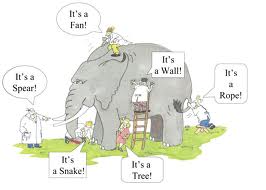→ AumAmen » Hinduism » Stories
→ AumAmen » Islam » Stories
→ AumAmen » Jainism » Stories
Six blind men who come to find out what an elephant is
 | Six blind men once went to find out what an elephant is. The first blind man touched the legs of the elephant, being a blind man he could only touch and not see. He touched the legs of the elephant and came to the conclusion that the elephant is like a big pillar or a tree; straight, round, long and strong with thick skin. The second man touched the tail of the elephant and came to the conclusion that an elephant is like a rope with a brush at the end and it can move right and left very easily in air. |
The third man touched the ear of the elephant and said, "Elephant is a flat animal, like a hand fan"
The fourth man who had touched only the trunk of the elephant said "No, the elephant is like a snake or a tree branch, rough on the surface and is hollow inside.
The fifth man who had touched its belly said "An elephant is like a big wall, but with curves here and there"
The sixth man who had touched only the tusk said "An elephant is like a pipe or spear and very strong"
After they found out they had disagreement, they went to a man who had eyes and had seen the elephant. Each explained his side of the story and asked him who was right among them.
The man who had seen the elephant said: "You are all partially correct, Elephant has features that you explained but it is much more"
Note: Buddhism, Hinduism, Islam (Sufi) and Jainism all have a variation of this story. But the message is the same.
In Sufi Poet and Mystic Rumi's words, the moral of the story is: The sensual eye is just like the palm of the hand. The palm has not the means of covering the whole of the beast.
In Ramakrishna Paramahansa's words, the moral of the story is: He who has seen the Lord in a particular way limits the Lord to that alone and thinks that He is nothing else.
In Werner Heisenberg's words, the moral of the story is: We have to remember that what we observe is not nature in itself, but nature exposed to our method of questioning